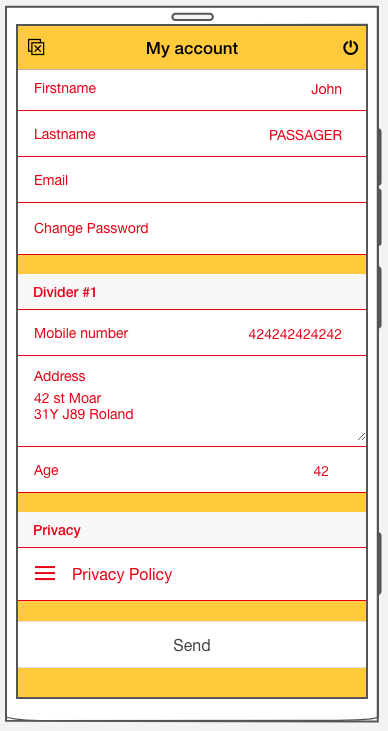My account
Account fields
With the 4.16.0 update, you are now allowed to extend My account with more fields for your modules.
Important Account::addFields must be used within the following hook from init.php
<?php
use Siberian\Hook;
Hook::listen("mobile.controller.init", "mymodule_extendedfields", "extendedFields");

<?php
Account::addFields(string $moduleName, array $fields, function $populateCallback, function $saveCallback);
<?php
use Siberian\Account;
function extendedFields ($payload) {
Account::addFields(
"MyModule",
[
[
"type" => "spacer",
"key" => "mymodule_spacer",
],
[
"type" => "divider",
"key" => "mymodule_divider",
"label" => __("Divider #1"),
],
[
"type" => "text",
"key" => "mobile_number",
"label" => __("Mobile number"),
],
[
"type" => "textarea",
"key" => "address",
"rows" => "3",
"label" => __("Address"),
],
[
"type" => "number",
"key" => "age",
"min" => "1",
"max" => "100",
"step" => "1",
"label" => __("Age"),
]
],
"populateMyFields",
"saveMyFields"
);
return $payload;
}
The different field types
| Type | Usage |
|---|---|
| spacer | This is a 20px blank spacer, simple. |
| divider | This is a divider title, it uses item item-divider item-divider-custom classes |
| text | A simple text input |
| textarea | A textarea with configurable rows |
| number | A range input with min, max & step settings |
| select | A dropdown selector with options: {["value": "single", "label": "Single"], ["value": "married", "label": "Married"]} |
Callback examples
The $populateCallback is called before generating the fields, it's used to populate them with the actual values and/or with defaults.
Note: $populateCallback must be a pure function accessible from everywhere, it's a good practice to declare it inside init.php
<?php
function populateExtended ($context, $fields)
{
/**
* @var $context
* [
* "application" => (current application),
* "request" => (current request),
* "session" => (user session)
* ]
* @var $fields
* [
* [
* "key" => "#Field_key#",
* "value" => "#Field_value", // defaults empty
* ],
* [...]
* ]
*/
$customer = $context["session"]->getCustomer();
foreach ($fields as &$field) {
switch ($field["key"]) {
case "mobile_number":
$field["value"] = $customer->getMobileNumber();
break;
case "address":
$field["value"] = $customer->getAddress();
break;
case "age":
$field["value"] = $customer->getAge();
break;
}
}
return $fields;
}
The $saveCallback is called before generating the fields, it's used to populate them with the actual values and/or with defaults.
Note: $saveCallback must be a pure function accessible from everywhere, it's a good practice to declare it inside init.php
<?php
function saveExtended ($context, $fields)
{
/**
* @var $context
* [
* "application" => (current application),
* "request" => (current request),
* "session" => (user session)
* ]
* @var $fields
* [
* [
* "key" => "#Field_key#",
* "value" => "#Field_value", // defaults empty
* ],
* [...]
* ]
*/
$customer = $context["session"]->getCustomer();
foreach ($fields as $field) {
switch ($field["key"]) {
case "mobile_number":
$customer->setMobileNumber($field["value"]);
break;
case "address":
$customer->setAddress($field["value"]);
break;
case "age":
$customer->setAge($field["value"]);
break;
}
}
// Finally save the customer
$customer->save();
return $fields;
}
